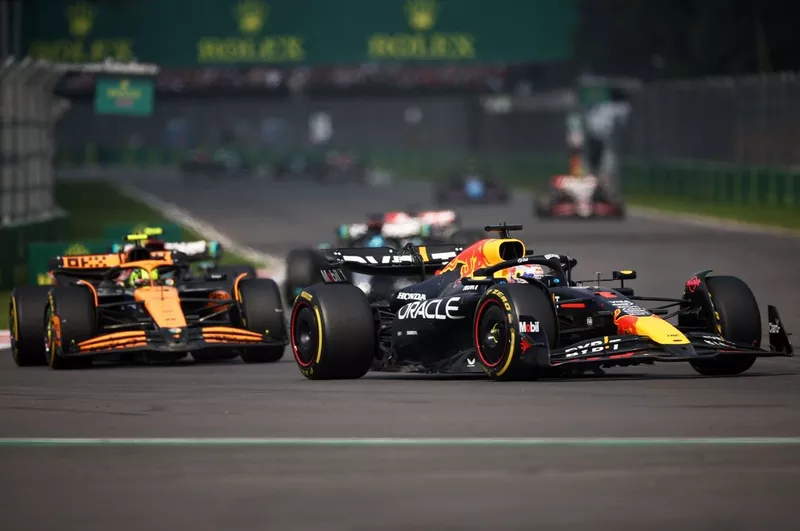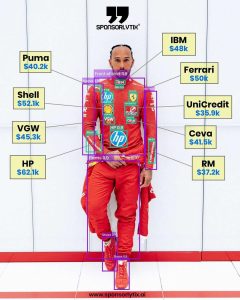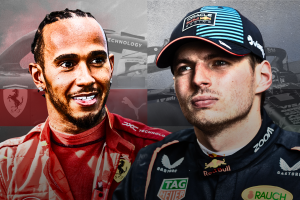BREAKING NEWS: Wolff Reflects on the Need for a Change in Racing Tactics

BREAKING NEWS: Wolff Reflects on the Need for a Change in Racing Tactics
Mercedes team principal Toto Wolff anticipates that the recent penalties imposed on Max Verstappen during the Mexican Grand Prix will significantly impact how drivers approach racing in Formula 1. Verstappen’s aggressive moves in Mexico led to two separate 10-second penalties, the first for pushing Lando Norris off-track early in the race, and the second for overtaking Norris off the circuit just moments later. These incidents, along with the stewards’ strict stance, suggest a potential shift in F1’s standards, as Verstappen’s moves did not go unpunished.
The penalties handed to Verstappen come only a week after controversy surrounding Norris, who received a five-second penalty for overtaking Verstappen off-track at the United States Grand Prix. Verstappen’s competitive racing style, which often involves ensuring he is ahead at the apex of corners, aligns with current rules that prioritize this position. However, his assertive approach has sparked discussions about possible adjustments to F1’s Driving Standards Guidelines. These changes may be implemented as soon as the Qatar Grand Prix.
Reflecting on Verstappen’s tactics, Wolff believes that the Mexico Grand Prix decision could deter such aggressive maneuvers in the future. He argues that the penalties signal a crucial turning point that will impact drivers’ behavior. With new guidelines potentially in place, drivers might reconsider taking risks that involve pushing others off-track or overtaking outside track limits, especially if penalties are likely to follow.
For Wolff, who has witnessed Verstappen’s aggressive style up close during the intense 2021 championship battle with Lewis Hamilton, these rulings are a welcome sign. He feels they could encourage drivers to exercise greater caution in close racing scenarios. The penalties, he believes, could bring about a much-needed shift, steering drivers away from riskier tactics that could otherwise become more commonplace if left unchecked.
The Mexico Grand Prix outcome not only reiterates the importance of maintaining clean and fair racing but also highlights the stewards’ commitment to upholding track limits. By penalizing Verstappen’s actions, the stewards have demonstrated a clear expectation for drivers to adhere to certain standards. If this approach is sustained, drivers may gradually adopt a more conservative approach in close racing battles, being mindful of potential consequences when they approach an apex or attempt an overtake.
For the broader F1 community, the incident serves as a case study on how enforcement of rules can influence racing dynamics. A stricter stance on track limits and aggressive defending may discourage drivers from pushing their boundaries too far. Wolff’s comments reflect his hope that such penalties will contribute to cleaner, more predictable racing in the future. As these standards are discussed and refined, drivers may adjust their strategies accordingly, leading to a less contentious approach in wheel-to-wheel battles.
Wolff sees this as an opportunity to reset standards within F1, setting a tone that prioritizes safety and fairness over risky maneuvers. For fans, stricter rules on track limits might create a more balanced and competitive race environment, where overtakes and defensive moves require more precision and skill rather than pure aggression. In Wolff’s view, consistent penalties for off-track overtakes or incidents of forcing others wide could reinforce the expectation that all drivers must respect the boundaries of the circuit.
Looking ahead, the penalties in Mexico could be a turning point for the sport, signaling to drivers that aggressive strategies will be monitored closely. This could lead to a gradual shift in racing behavior, with competitors opting for a more calculated approach in overtakes and defensive maneuvers. With potential revisions to the Driving Standards Guidelines on the horizon, F1 may see an evolution in how drivers navigate close racing situations, balancing the need to be competitive with the requirement to stay within track limits.
In summary, Wolff’s perspective is that the stewards’ strict response to Verstappen’s racing in Mexico may influence other drivers to reconsider aggressive moves, particularly those involving track limits. By penalizing Verstappen, the stewards have established a precedent that Wolff believes could foster a cleaner, more disciplined racing environment. If this approach is upheld in future races, F1 may witness a subtle but significant shift in the strategies drivers use to defend or challenge positions, aiming for more controlled and strategic racing.





